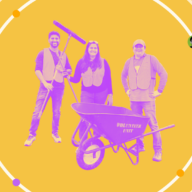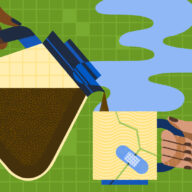As the dust of 2020 continues to settle (nobody move!), you may find that it’s chosen to settle on your Trello boards. With cards astray and due dates glaring, it’s time to gain control over the board that once used to be your BFF (board friends forever).
Trello boards are a living and breathing system and do need a bit of love to make sure they’re working properly. This doesn’t need to mean more work for you and your team, though. Luckily, there are plenty of ways to keep your lists, cards, and actions more organized, visual, and automated.
Once you find the system and features that work best for your team, Trello’s toolbox can actually do most of the maintenance for you! Discover how to regain clarity on projects big and small by cleaning up and breathing life into your Trello boards once again.
A Board Restructure May Be In Order
First things first: if you’re frustrated with the way your board is looking and working, it might be time to take another look at how it’s structured. Just as teams and companies evolve over time, so do the projects they work on. The process or workflow you once needed the board for might look slightly different now, so the project stages within your board may need some tweaking as well.
Reorder Or Rename Lists
Ask yourself and your team: “Does the flow of the lists still make sense?” Sometimes, a simple renaming of a list or rearranging their order can make a world of difference. There may be a small but important step in the process that should be added in, or maybe there’s a step that is no longer relevant and just creating clutter. Take a few minutes to review the lists and decide as a team which changes are necessary.
Update The “About This Board” Section
Whether it’s an entire list on the left side of the board or just a single card, you should always have a place that clearly explains how the board works. If a board has been around for years, these details may need some updating. Team members may be confused about how to use the board in the first place, which may be the culprit of that board clutter you’re trying to avoid.
It should be clear to anyone who joins the board how to move tasks through the lists, which Power-Ups are enabled and how to use them, who is responsible for certain tasks, and frequently asked questions.
A Separate Board May Be The Answer
Sometimes, an unruly board may be a sign that a project has outgrown its space with multiple workflows or just simply too much information, and a new board is needed to offset the load.
Example: A small startup company was able to fit their entire recruiting process into one board when they were only hiring for a couple of positions at a time. At that time, one board could house all positions for all departments, and it was easy for the HR team and managers to keep track of candidates, interviews, and their hiring status. But as the company grew and started hiring for dozens of positions in multiple departments, this process became too complicated to house in just one board. The solution? A separate board was created for each department or team, which successfully separated the many details in a more organized fashion.
No need to recreate a board from scratch! You can copy a board and all of its lists, contents, and details with a simple click. Or, you can get started with a pre-built Trello template for any project or workflow.
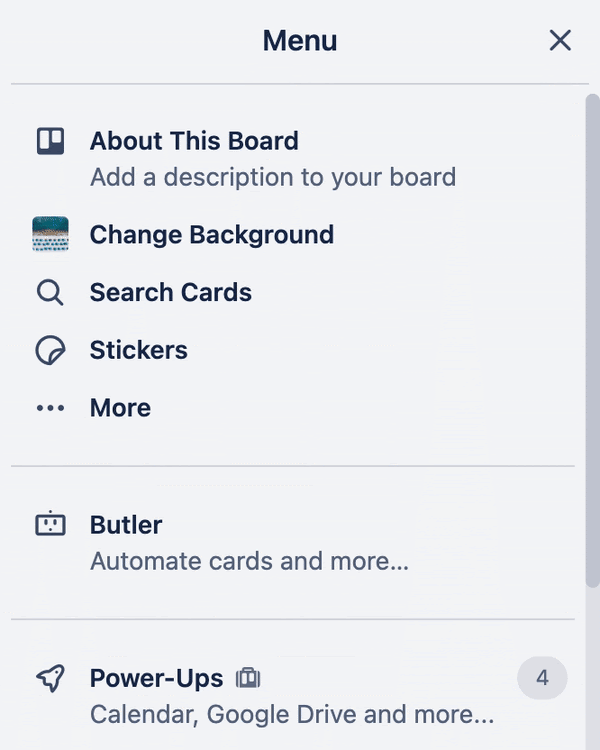
Harness The Power Of Power-Ups
Power-Ups are tech magicians that add greater efficiency, collaboration, and features to your boards. While there are hundreds to choose from, there are a few in particular that are helpful for restoring law and order to your boards.
Card Aging
Is your board looking a bit… decrepit? The Card Aging Power-Up helps you see cards on a board that haven’t been touched in a while. It’s a great way to create a gentle reminder for your teammates when tasks are getting left behind. When enabled, cards will visibly age with inactivity.
There are two modes: “Regular” and “Pirate”. In regular mode, cards become progressively more transparent and “fade out” the longer they remain untouched. In pirate mode, cards will tear, get dark, and crack like an old pirate map.
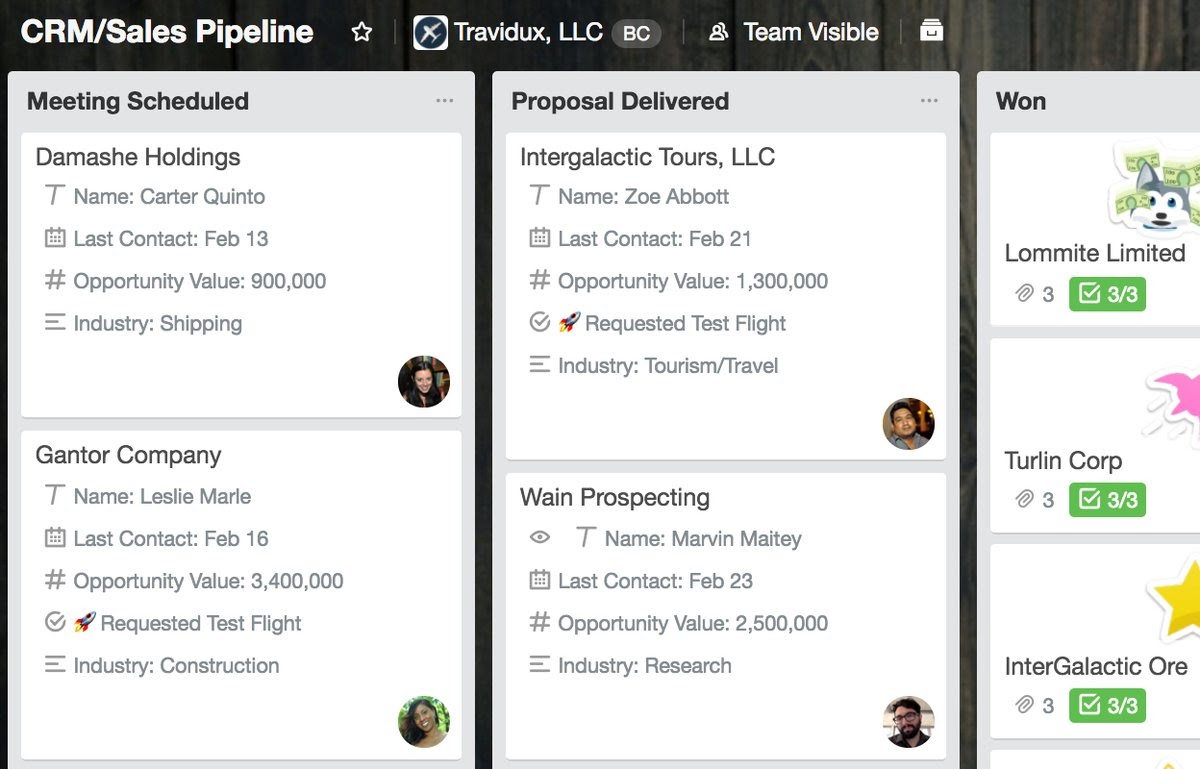
In the case that a card on your board doesn’t ever need an update, you can select that card as ‘Evergreen’. Evergreen cards won’t age like their fading or pirate-ing counterparts, keeping your board clean from unnecessary cracks and withering.
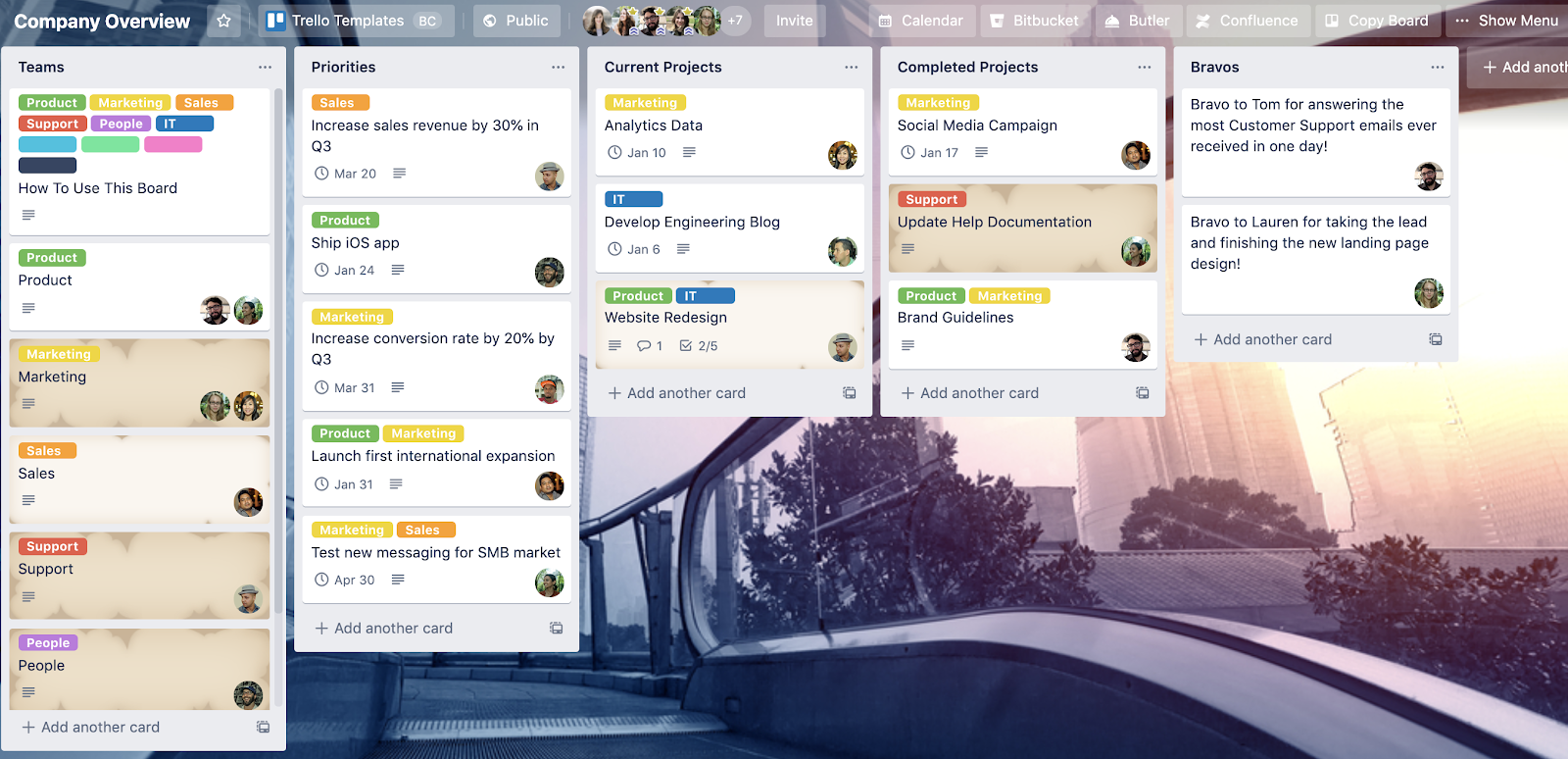
Google Drive
The Google Drive Power-Up for Trello makes attaching Google Drive links simpler than ever by allowing you to attach Google files and folders from right inside your cards. You can either copy+paste the link of the specific document/sheet/presentation into your card OR you can create and attach a Google document directly from the card.
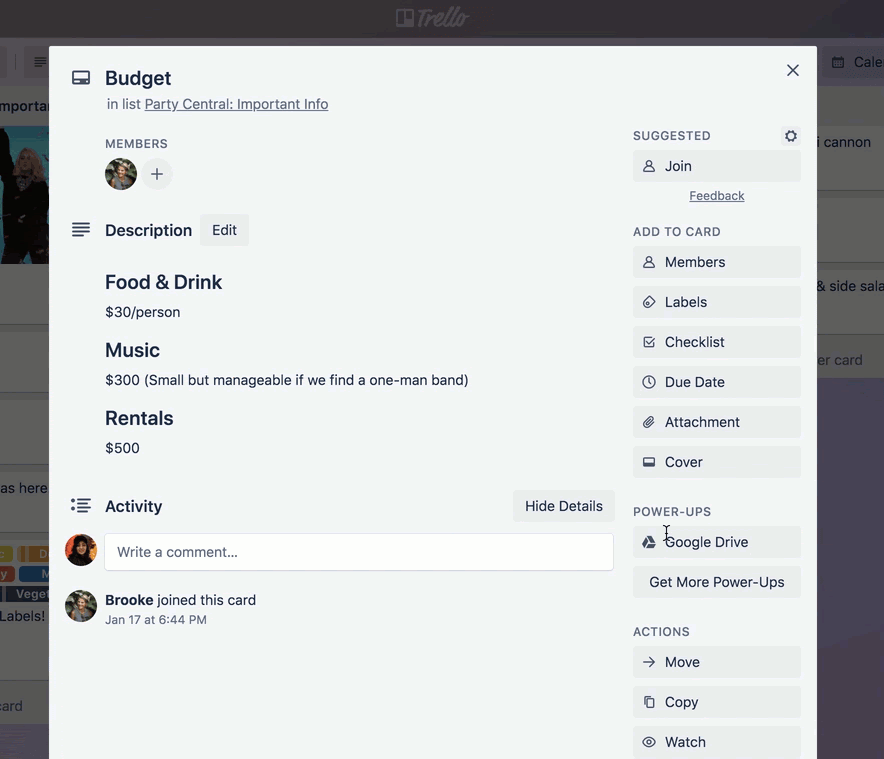
You’ll also see an enhanced thumbnail view of the Google Drive attachments, which can come in handy if you’ve attached a folder of design assets and you need to easily see which one you want to open.
With the Google Drive Power-Up, there’s no more back and forth of, “where’s that file again?” Everything stays put in one place as your team collaborates, makes changes, and creates new documents, together.
Custom Fields
Another favorite, Custom Fields, will rock your world. Some details need to be seen on the front of the card and labels aren’t always the best way to communicate that. Enter: the Custom Fields Power-Up.
At a glance, you can see details that may need to be shown upfront. Such as who paid which invoice, the amount, or even the last time you spoke to them. It can be super basic information to get a general sense of details on a specific task or project.

You can view information in different formats including:
- Custom text fields: Add a space to enter names, email addresses, or other information that’s crucial for your cards to have.
- Numbers: Enable your cards to show story points, number of guests, order numbers, or any other number.
- Checkbox: Need to know when something is approved or if there are special considerations? Add a checkbox.
- Dates: Milestones, checkpoints, order dates—make sure crucial dates are shown on your cards.
- Dropdown lists: When you need to select from multiple options like status or SKUs, a dropdown is your best bet.
Custom Fields allows you and your team to view more information from the board-view, without needing to click into specific cards to view the details. More context, more visual bliss, more organization!
Voting
Voting is important, whether it’s for the next election, or you and your team choosing the team mascot. Use the Voting Power-Up to allow all members of a board to easily vote on brainstorm ideas or agree with certain thoughts over others. This way, you can easily see which ideas have been approved to move forward with, and which should be archived and cleared away.
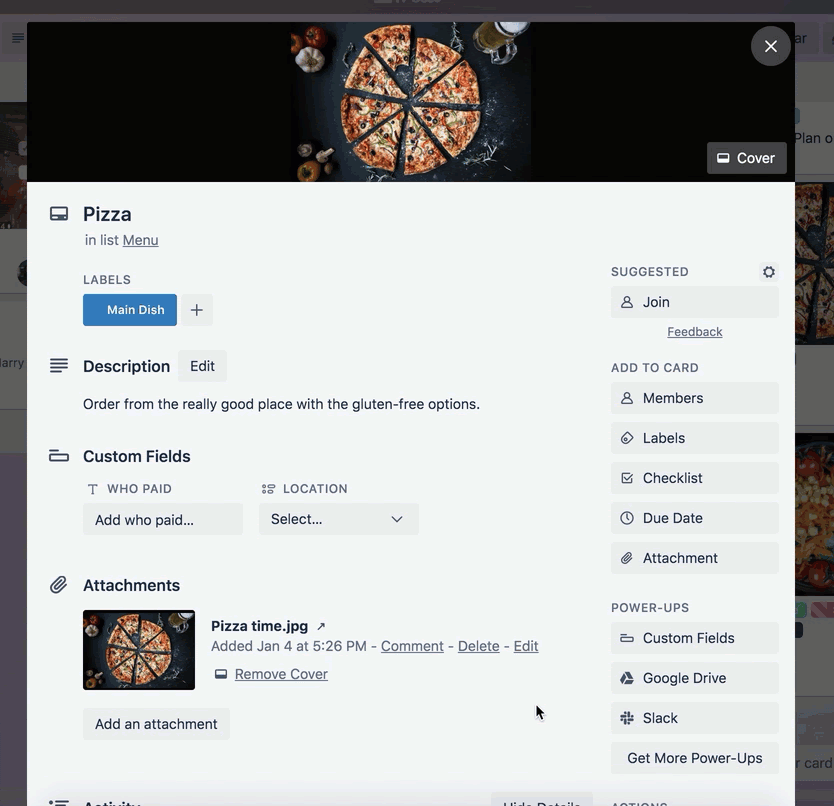
Once you’re all done voting, you can sort your list by number of votes to easily see which card prevailed!
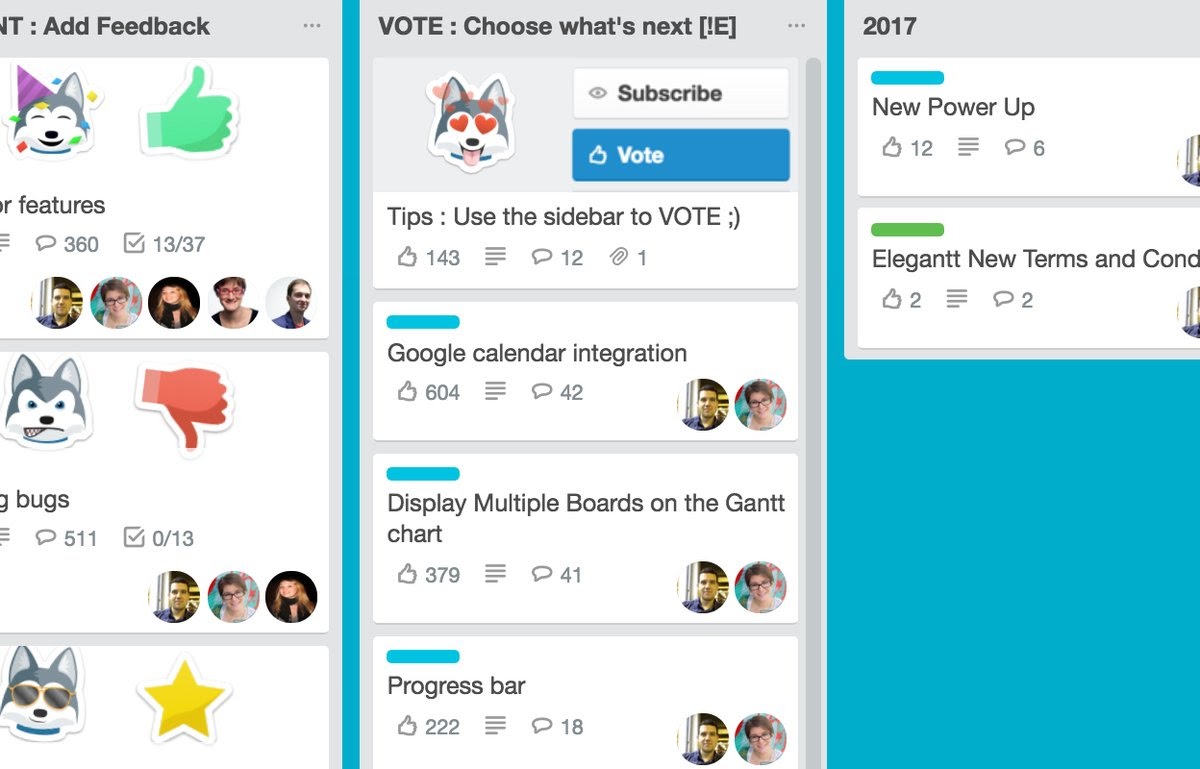
Approvals
Simplify your approval process with the Approvals for Trello Power-Up. It allows you to add approval functionality to any Trello card, and “assign” that approval to members of your board. Plus, everyone can quickly see the approval status of a card at a glance, with simple “pending” or “approved” badges.
From the board view, you can easily see how many approvals have been granted, and how many remain. By enabling this Power-Up you can keep tasks under review moving forward efficiently.
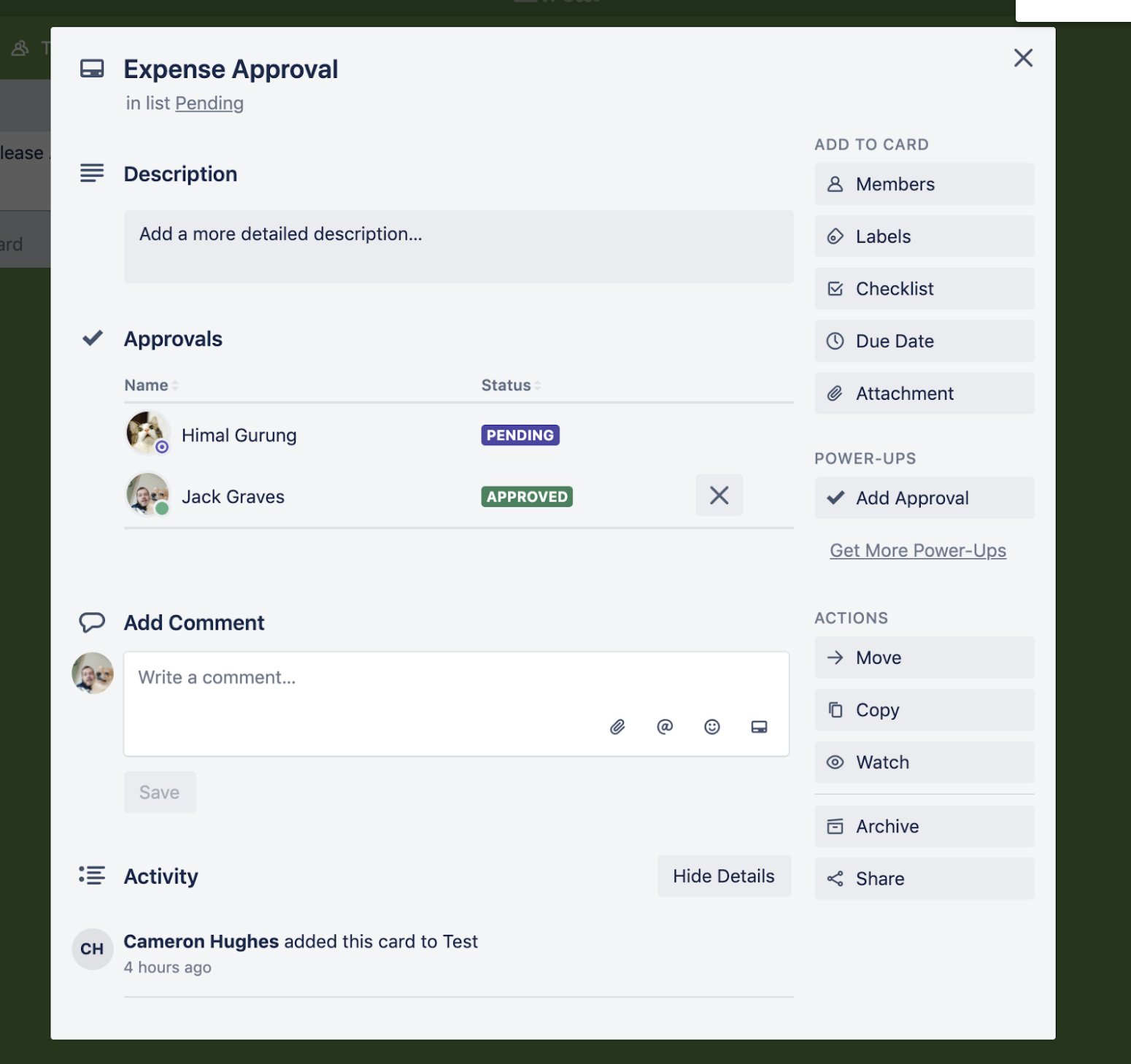
Card Covers, Colors, And Labels
There are many ways to make your Trello board more visually appealing and orderly, and the most popular methods by-far are with Card Covers, Colors, and Labels.
Full Card Covers
In addition to being able to upload your own images as Card Covers, you can select a card cover from the vast pool that is the Unsplash Gallery (just like when you’re picking the perfect board background!). Here’s how it works:
Once you attach an image to a card, you are able to select different sizing options for the front cover display. Click on the button named “Cover” on the card back, and then choose whether you want the attachment to display above the card name, or as the full height of the card:
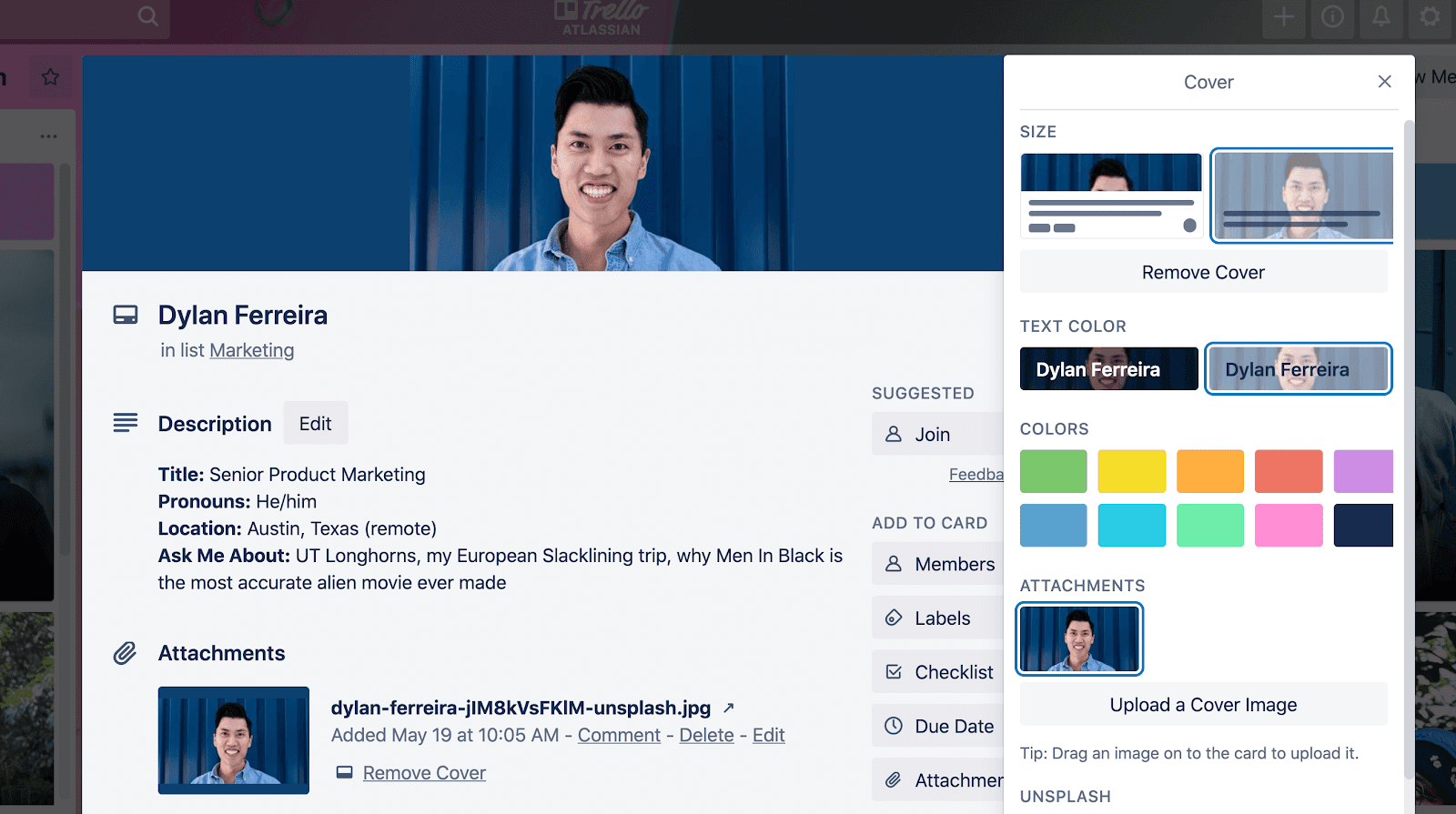
If you select the full height of the card, you are then prompted to choose a text color to appear as the card name’s overlay. Depending on how light or dark the picture is, you can choose a different text option to display:

The card on the left is displaying light text, and the card on the right is showing dark text for the card name.
Full card covers make for great visuals on your boards, whether you need to display a repository of images for a recipe board or a Team Directory. No matter how you use Trello, your board is now more beautiful and easy to read.
Card Colors
In the same “Cover” button as above, you also have the option to select from color swatches. The sizing is the same as images–the colors can either appear above the card name, or as the full height of the card.
You can display Card Colors as a card header, or change the entire color of the card. And you can use Card Colors in a couple of different ways: as list headers or list separators.
Bring visual context at the top of your Trello lists, or provide additional callouts and details for which cards should go in a particular list is helpful for others attempting to navigate your board.

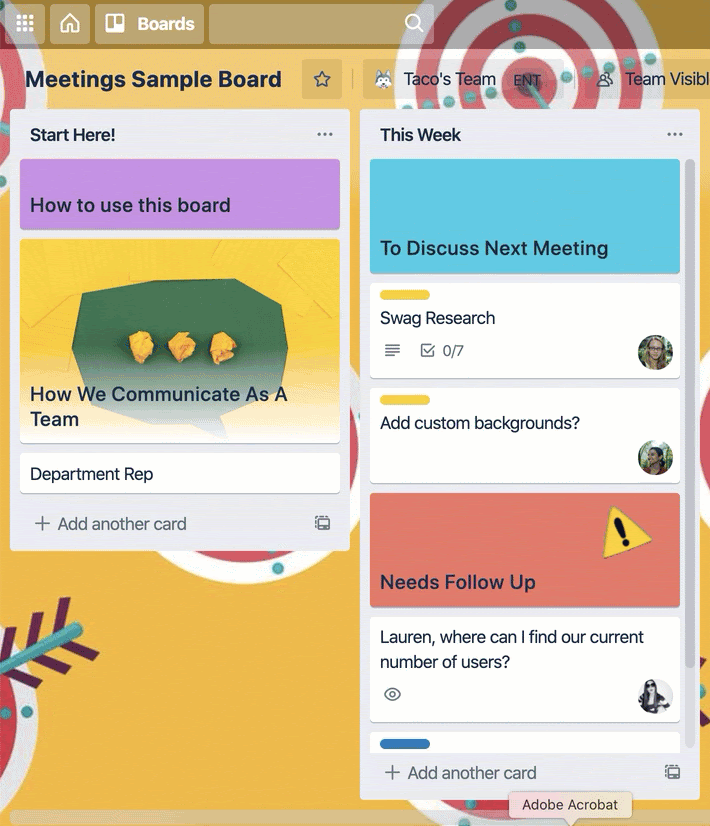
Labels
One of the simplest ways Trello users can add a pop of color, structure, and clarity to your boards is by adding labels to cards.
With the use of labels, you not only get an extra layer of information at a glance, you also achieve more robust filtering and search capabilities right at the tip of your fingers. You can use labels in many different ways: to prioritize tasks, to organize cards by teams, or to catalog a repository of cards by subject. There’s even a color blind friendly option!
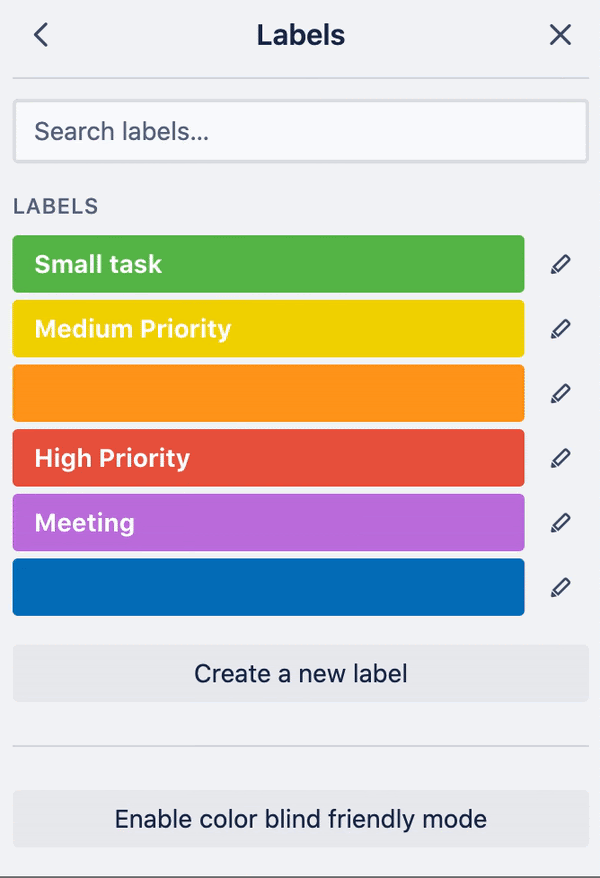

Gain Control With Advanced Checklists
There’s no better way to break down tasks for a large project than with a simple and visual checklist. With Trello’s Advanced Checklists, you can assign tasks to specific members of your team and add due dates to a checklist item.
So instead of cluttering your board with separate cards for each subtask within a project, you can keep all stages nice and orderly in one card, complete with assigned team members and due dates.
All items will appear in your Calendar, as well as in the Your Items tab on your Trello Home screen, making sure small tasks don’t slip through the cracks.
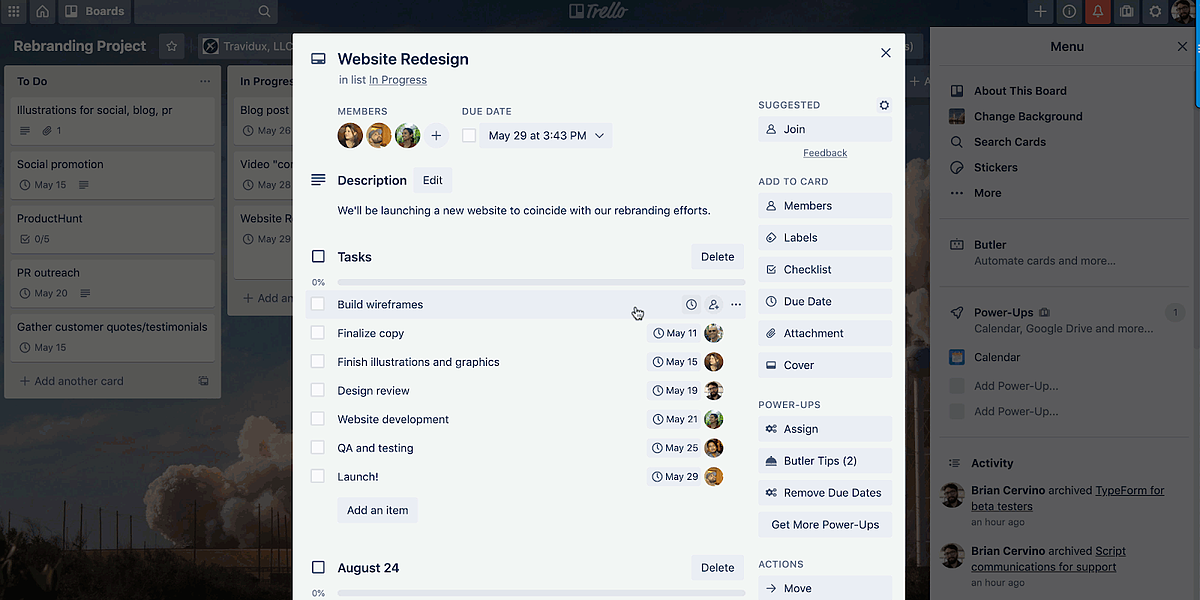
Butler To The Rescue
Imagine having a personal assistant who helps you move your cards and communicate with the right people when a task is done. Look no further—meet Butler! It’s Trello’s powerful automation tool that helps you and your team automate task actions through rule-based triggers, calendar, and due dates commands.
No more tedious maintenance of moving cards to their proper lists or tagging team members time after time—allow Butler to do the work for you!
Butler allows you to automate an infinite number of tasks simultaneously, but here are the top three task management automations for you to try out:
- When a task needs to be revised by another team member, Butler can add an automated comment to the card and tag the revisor when it’s moved to a certain list or a label is added.
- When a card is created in a “To Do” list, Butler can add the “Steps” checklist so that you don’t miss a beat.
- When a task is moved to the done list, Butler can automatically send an email confirming its completion. Great to keep key stakeholders aware of what’s going on.
Order In The Board: Restored
With the right knowledge of Trello’s features, you and your team can successfully bring back a board from the depths of disorganization. Breathe a sigh of relief as you move through each task within your squeaky clean board, free of dust and disorder.





 )
) 











